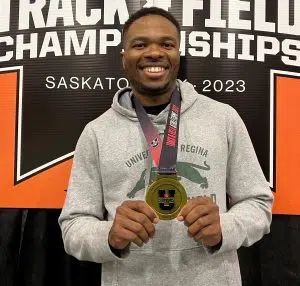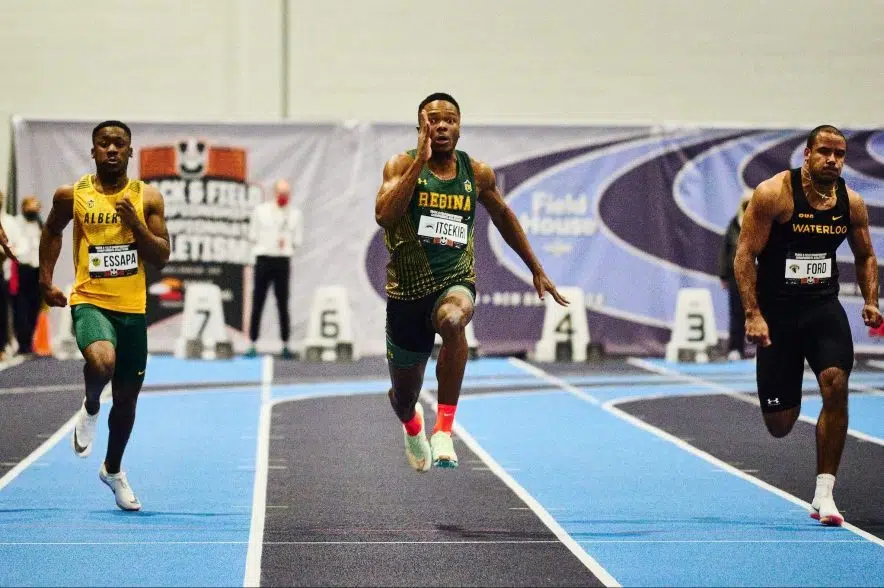Usheoritse Itsekiri might not have known where Regina was on a map a few years ago, but he’s helping the city make some noise on the track and field scene.
The 25-year-old Nigerian Olympian is now a sprinter with the University of Regina Cougars track team.
“I wasn’t expecting much coming to Canada, but I was optimistic. I came here and saw a good team. I blended in and fit in well,” Itsekiri said.
“We are putting Regina on the map. Last year, we got one gold (at the U Sports championship). This year, we got two. Hopefully next year we are getting three or four.
“I really like the 4×200(-metre relay) medal because I saw the energy from the other boys and it was good. It was everybody to put ourselves down, bring out our best and get the record. Everyone ran almost close to the second-fastest to what they usually would run. We got the school record and got a gold medal. I’m happy for that.”
Itsekiri has enjoyed a lot of success at the U Sports level, winning two straight gold medals in the 60-metre dash. He broke his own school record at the 2023 U Sports track and field championships in Saskatoon, covering the distance in 6.61 seconds.
Our first two medals of the @USPORTSTF meet! @Dushos wins
for the second straight year and once again breaks his own school record with a time of 6.61 seconds!@StormZablocki claims
in his first national meet with the Cougars and finishes in a PB of 6.71
#WeAreUofR pic.twitter.com/tqJctEGiKB
— U of R Cougars Track & Field and Cross Country (@ReginaCougarTF) March 10, 2023
He also helped the University of Regina bring home a gold medal in the men’s 4×200 relay.
“Winning the (4×200) with the boys, it’s not just me, it’s a group effort from everyone putting it together,” Itsekiri said.
The sprinter’s journey to Regina started in his home country of Nigeria.
“Growing up, I played soccer a lot,” said Itsekiri, who hails from Sapele. “I was fast on the pitch and that’s why I started doing track. Usually the track is beside the pitch so the coaches can see you going really fast on the pitch and that’s where they get you from.
“I didn’t really think I could go this fast. I started running fast and one day I was running and beat everyone on the track team and I was like, ‘OK, I am fast. Maybe I can do something with it.’ ”
With his focus shifted to the track, Itsekiri became one of the fastest runners in Nigeria. But even to him, the Olympics always seemed like a longshot.
“Going to the All-African Games, my agent told me it was possible (I) could get the Olympic standard and I was like, ‘That’s too far. I don’t think I can run less than 10.05.’ I had run 10.07 once,” Itsekiri said. “I went to the All-African Games and I got the standard and it was like, ‘OK this is possible.’ ”
He ended up running a 10.02 at the Games.

University of Regina sprinter Usheoritse Itsekiri with his gold medal from the men’s 60 metres at the 2023 U Sports track and field championships. (Arthur Ward/U of R Athletics)
“The dream then became a reality. I didn’t know that I could go that fast,” Itsekiri said.
While he qualified for the 2020 Tokyo Olympics, his wait became even longer as the COVID-19 pandemic forced the Games to be postponed.
“It was tough … I started to make plans and once COVID hit, it was bad because I didn’t know where I was at,” he said. “Coming off COVID, it was terrible because I came out running slow because there wasn’t a training facility and I had to come up with a whole different plan.”
But while the Games eventually started, he had to deal with a hamstring injury that plagued him heading into the Games.
“I was hurt in the season because I was going too fast and my body wasn’t prepared for it because I was running slow coming off the pandemic and I was trying to go fast. I was picking it up but my body wasn’t prepared for it,” Itsekiri said.
“I got hurt and I was like, ‘It’s the Olympics, you don’t know what’s going to happen in the next four years.’ I didn’t know I was coming to Canada. So I had to give it a shot. The doctors were like, ‘Are you sure you can go?’ I was like, ‘I have to give it a shot.’ ”
Itsekiri made it out of the heats with a time of 10.15.
“I made it through the heats but that wasn’t my best performance during the heats because I was thinking while running, ‘I made it through the heats. I have to make it through to the finals. Either it snaps here or it doesn’t snap because I’m not going to use my legs after the Olympics,’ ” Itsekiri said.
But in the semis, Itsekiri’s injury got worse and he failed to qualify for the finals.
With some time to heal and train before the 2024 Paris Olympics, it was Regina that got onto his radar. His uncle, who lives in the Queen City, encouraged Itsekiri to come to the university to earn his master’s in electrical engineering.
“My uncle was like, ‘OK, the Olympics are over, you have an injury and have another four years to prepare. By then you will be done with school,’ and the math made sense in my head,” Itsekiri said.
Now, he has had to get used to the tribulations that come with being a student-athlete.
“It’s tough. Last year, I made the worlds and the Commonwealth team and I couldn’t go because school is hard,” Itsekiri said. “It’s a new way of learning things; this is not how it was done in Nigeria.
“It was hard on my adapting with all the competitions and all that and it was really tough. This year, I’m not having much of an outdoor season either because I’m chasing both things and I’m not getting work done at either of them. I want to get one done fully and then focus next year on the Olympics.”
That goal of reaching an Olympic podium remains top of mind.
“I was in the semis last time; hopefully I get into the finals this time,” Itsekiri said. “I just want to be healthy and have my training go as planned.”











